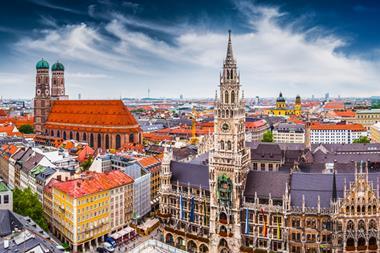Investment in property within Europe is set to reach a record high of €250bn this year, with investors remaining keen into 2016 to take on new real estate investments, with low interest rates keeping property relatively attractive, DTZ predicts.
In its latest ‘Money into Property’ report on the value of commercial real estate stock held by investors, the property services company said the value of European property stock had reached a new record of €3.4trn in 2014.
Meanwhile, around the world, the level reached $13.6trn (€12.1trn), also a record high, up 4% from the year before.
DTZ said that, globally, growth had been led by a 10% rise in Asia Pacific property stock, to $5.1trn.
This, in turn, had been largely due to developments in China, where the value of property stock held by investors surged 21% last year.
Nigel Almond, head of capital markets research at DTZ, said: “With record levels of new capital targeting commercial real estate, global investment activity is set to reach €678bn this year, just short of the €696bn record in 2007.”
In Europe, he said the researchers expected volumes to reach €250bn this year, higher than their previous peak seen in 2007 of €230bn.
“We expect the appetite for investment continuing into 2016, as real estate still looks attractive (compared) with other assets in the current low-interest-rate environment,” he said.
Looking at individual European markets, Turkey saw the strongest stock value growth in the world in 2014, at 30%, though DTZ noted this had been from a relatively low base.
Finland showed the sixth-fastest growth globally, with 15%, while Norway’s 10% growth last year ranked its progress at 10th in the world.
At the other end of the scale, though, the Russian market was in the bottom 10 in terms of growth, with a 19% fall in values, in the wake of economic sanctions and trouble in Ukraine, according to the report.
Property stock values in Spain slid 8% last year, and, in the UK, values fell back by 2%, with developments in both countries driven by further falls in debt.
Almond commented that the burden of debt across Europe had hindered its growth.
“The struggles of highly leveraged European markets such as the UK, Ireland and Spain in recent years contrast with lower-leveraged markets in Asia, for example, which have benefited from stronger growth,” he said.
In the current cycle, DTZ said equity was still replacing debt in the capital stack, with equity growing by 8% globally in 2014 compared with 2% debt growth.
The value of debt outstanding to real estate was €1.8trn of the €3.4trn of European invested property stock, having shrunk 2% in 2014.
Reduction in debt varied considerably from country to country last year, however, at 11% in Spain, whereas debt increased by 1% in France and 3% in Sweden.
On the other hand, equity grew by 6% to €1.6trn, with the strongest growth coming via unlisted funds, where equity holdings increased by €43bn.










